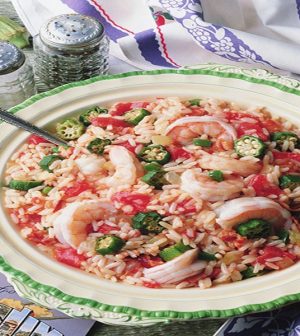- Could Your Grocery Store Meat Be Causing Recurring UTIs?
- Are You Making This Expensive Thermostat Error This Winter?
- Recognizing the Signs of Hypothyroidism
- 10 Strategies to Overcome Insomnia
- Could Artificial Sweeteners Be Aging the Brain Faster?
- Techniques for Soothing Your Nervous System
- Does the Water in Your House Smell Funny? Here’s Why
- Can a Daily Dose of Apple Cider Vinegar Actually Aid Weight Loss?
- 6 Health Beverages That Can Actually Spike Your Blood Sugar
- Treatment Options for Social Anxiety Disorder
5 Ways to Get More Whole Grains Into Your Diet

Making the switch to whole wheat bread and whole wheat pasta are good ways to get more unrefined grains (and needed fiber) into your diet.
But there’s a long — and delicious — list of other whole grains to add to your meals throughout the day. In fact, because even though whole wheat is still processed (though not to the extent as white flour), some of the older, minimally processed grains that have come back into vogue are even better choices.
Great Grains:
- Amaranth.
- Barley.
- Brown rice.
- Buckwheat (kasha).
- Bulgur.
- Cornmeal (grits, polenta).
- Couscous.
- Farro.
- Millet.
- Oats.
- Quinoa.
- Rye.
Oatmeal is an obvious choice for breakfast. But try steel-cut oats, which are less refined than rolled oats. Or shake up your morning routine by cooking up grits or buckwheat for your hot cereal.
Cooked barley, besides being a tasty side dish, can make a hearty addition to your favorite vegetable soup for a satisfying lunch or dinner. Be sure to make enough barley to sprinkle what’s left over onto your next salad.
Build dinner around a serving of polenta or quinoa-pasta topped with sauteed vegetables.
Vary your favorite recipes simply by making whole grain substitutions. Instead of making a risotto or a pilaf side dish with white rice, try using buckwheat, millet, couscous or polenta as the grain. Whichever one you use will take on the flavors of the other ingredients in the recipe.
Note that many grains cook in little time, but you might find it handy to make a large batch once or twice a week. The cooked grains will keep for up to 4 days in the fridge to use as you like.
More information
The Oldways Whole Grains Council has much more on whole grains, including cooking times.
Source: HealthDay
Copyright © 2026 HealthDay. All rights reserved.










